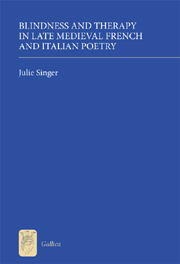Book contents
- Frontmatter
- Contents
- In loving memory of Mrs Doris Patz artist, benefactress, friend
- List of Illustrations
- Acknowledgements
- Introduction: On Rhetoric and Remedy
- Chapter 1 The Love-Imprint
- Chapter 2 Medical Blindness, Rhetorical Insight
- Chapter 3 Irony, or the Therapeutics of Contraries
- Chapter 4 Metaphor as Experimental Medicine
- Chapter 5 Metonymy and Prosthesis
- Chapter 6 Blindfold Synecdoche
- Epilogue. Just Words
- Bibliography
- Index
- Already Published
Chapter 2 - Medical Blindness, Rhetorical Insight
Published online by Cambridge University Press: 12 September 2012
- Frontmatter
- Contents
- In loving memory of Mrs Doris Patz artist, benefactress, friend
- List of Illustrations
- Acknowledgements
- Introduction: On Rhetoric and Remedy
- Chapter 1 The Love-Imprint
- Chapter 2 Medical Blindness, Rhetorical Insight
- Chapter 3 Irony, or the Therapeutics of Contraries
- Chapter 4 Metaphor as Experimental Medicine
- Chapter 5 Metonymy and Prosthesis
- Chapter 6 Blindfold Synecdoche
- Epilogue. Just Words
- Bibliography
- Index
- Already Published
Summary
Et vis videre quid in imo viscerum ac fibrarum lateat? Quod est ante oculos non vides!
And you claim to see that which lies within the viscera and tissues? You can't even see what's before your very eyes!
Petrarch, Invective contra medicum IINothing is more punitive than to give a disease a meaning – that meaning being invariably a moralistic one.
Susan Sontag, Illness as MetaphorIn the preceding chapter we traced a significant overlap between medical and poetic discourses of eyesight and love. This well-documented intersection of poetic, physical, and physiological constructs of the body is often ascribed in contemporary critical literature, implicitly or explicitly, to a process of poetic ‘medicalization’, as defined in the Introduction. In this chapter, however, we shall see that some medieval writers remark upon this overlap and attribute it, rather, to an inappropriate rhetoricization of medicine. When medical discourses are seen as borrowing the terminology and tools of the writerly arts, poets push back: critiques of medical practitioners' attempts at rhetorical ornamentation are commonplace in the antimedical writings that abounded in the fourteenth-century West, and especially in the invectives and letters of Petrarch. Petrarch's telling reliance on the figure of visual impairment in his attacks on the medical profession pathologizes not love, this time, but medicine itself. Consequently the physician cannot heal himself; only the rhetorician holds the keys to therapeutic discourse.
In the Invective contra medicum, along with a number of his epistles, Petrarch defends his art – rhetoric – against medical practitioners, seeking to delineate the boundaries between medical and poetic writers' respective fields of authority.
- Type
- Chapter
- Information
- Publisher: Boydell & BrewerPrint publication year: 2011



